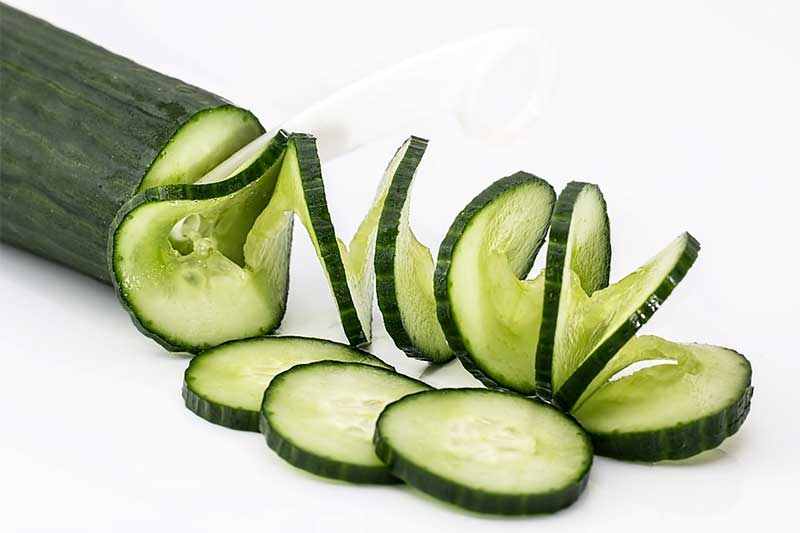When it comes to managing diabetes, getting plenty of nutrient-rich, high-fiber vegetables is important. These foods help with both blood sugar management and long-term condition management.
According to the National Institute of Diabetes and Digestive and Kidney Diseases (NIDDK), in creating a diet for type 2 diabetes, we need to include a variety of healthy carbohydrates, fats, and proteins in our diet (1).
Cucumber And Diabetes
Uncontrolled diabetes can lead to complications including cardiovascular diseases, nerve damage, kidney damage, eye damage, foot damage, and hearing impairment (2).
Cucumber is a non-starchy vegetable with a glycemic index (GI) of just 15 – any food with a GI less than 55 is considered low. Low-to-moderate-GI vegetables improve blood glucose control and reduce the risk of weight gain. A high GI food can raise our blood sugar levels (3,4).
This is a high-water vegetable that can actually help keep us hydrated as well as feeling full. According to a study, adding cucumbers to our diet might help reduce and control blood sugar levels (5,6).
Cucumber has high fiber content. Fiber can help control blood glucose levels. It also helps slow down the digestion of carbohydrates and sugar, which can further lower sugar levels. In addition to this, the veggie also exhibits anti-inflammatory and antioxidant properties. (7,8)
In an animal study, results showed that supplementing cucumber peels in induced diabetes in mice can help reverse most of the diabetes-associated changes and cause a decrease in blood sugar (9).
Aside from this, another study showed that cucumbers may possibly help in reducing oxidative stress and preventing diabetes-related complications (10).
Tips For Diabetics
- Keep meals healthful and flavorsome by avoiding too much added salt or relying on prepackaged ingredients that are high in sodium.
- Eat foods from all food groups.
- Plan to stop eating 2–3 hours before bedtime, in most cases, as 12 or more hours of nighttime fasting helps glucose control.
- Remember that eating vegetables is just one part of managing a lifestyle with diabetes.
Other Foods That May Help Control Diabetes
Leafy green vegetables like spinach and kale.
Avocados – contains less than 1 gram of sugar, few carbohydrates, a high fiber content, and healthy fats.
Chia seeds – extremely high in fiber, yet low in digestible carbs.
Broccoli – may help lower insulin levels and protect against cellular damage.
Sources:
- https://www.everydayhealth.com/hs/managing-type-2-ac/best-and-worst-foods/
- https://www.mayoclinic.org/diseases-conditions/diabetes/symptoms-causes/syc-20371444
- https://www.timesnownews.com/health/article/cucumber-water-benefits-type-2-diabetes-this-refreshing-summer-detox-drink-can-help-lower-blood-sugar-levels/390866
- https://pubmed.ncbi.nlm.nih.gov/29524810/
- https://www.eatingwell.com/article/7763406/best-vegetables-for-diabetes/
- https://pubmed.ncbi.nlm.nih.gov/8569244/
- https://www.ndtv.com/food/diabetes-eating-cucumber-regularly-may-help-reduce-blood-sugar-levels-1884961
- https://defeatdiabetes.org/resources/healthful-eating/vegetables/cucumber/
- https://pubmed.ncbi.nlm.nih.gov/20614191/
- https://www.ncbi.nlm.nih.gov/pmc/articles/PMC4916550/
Disclaimer
The watching, interacting, and participation of any kind with anything on this page does not constitute or initiate a doctor-patient relationship with Dr. Farrah®. None of the statements here have been evaluated by the Food and Drug Administration (FDA). The products of Dr. Farrah® are not intended to diagnose, treat, cure, or prevent any disease. The information being provided should only be considered for education and entertainment purposes only. If you feel that anything you see or hear may be of value to you on this page or on any other medium of any kind associated with, showing, or quoting anything relating to Dr. Farrah® in any way at any time, you are encouraged to and agree to consult with a licensed healthcare professional in your area to discuss it. If you feel that you’re having a healthcare emergency, seek medical attention immediately. The views expressed here are simply either the views and opinions of Dr. Farrah® or others appearing and are protected under the first amendment.
Dr. Farrah® is a highly experienced Licensed Medical Doctor certified in evidence-based clinical nutrition, not some enthusiast, formulator, or medium promoting the wild and unrestrained use of nutrition products for health issues without clinical experience and scientific evidence of therapeutic benefit. Dr. Farrah® has personally and keenly studied everything she recommends, and more importantly, she’s closely observed the reactions and results in a clinical setting countless times over the course of her career involving the treatment of over 150,000 patients.
Dr. Farrah® promotes evidence-based natural approaches to health, which means integrating her individual scientific and clinical expertise with the best available external clinical evidence from systematic research. By individual clinical expertise, I refer to the proficiency and judgment that individual clinicians acquire through clinical experience and clinical practice.
Dr. Farrah® does not make any representation or warranties with respect to the accuracy, applicability, fitness, or completeness of any multimedia content provided. Dr. Farrah® does not warrant the performance, effectiveness, or applicability of any sites listed, linked, or referenced to, in, or by any multimedia content.
To be clear, the multimedia content is not intended to be a substitute for professional medical advice, diagnosis, or treatment. Always seek the advice of your physician or other qualified health providers with any questions you may have regarding a medical condition. Never disregard professional medical advice or delay in seeking it because of something you have read or seen in any website, video, image, or media of any kind.
Dr. Farrah® hereby disclaims any and all liability to any party for any direct, indirect, implied, punitive, special, incidental, or other consequential damages arising directly or indirectly from any use of the content, which is provided as is, and without warranties.









